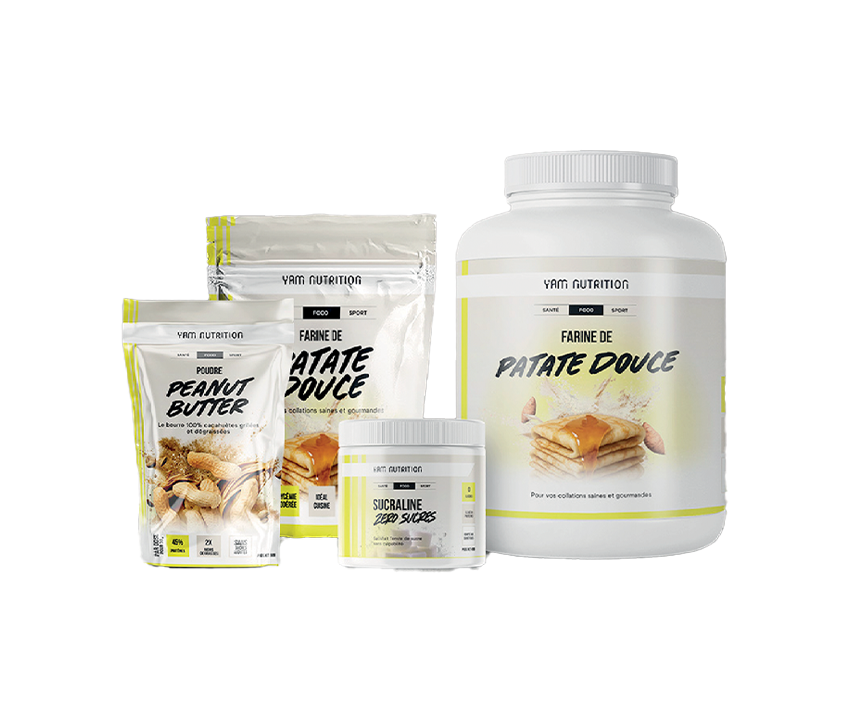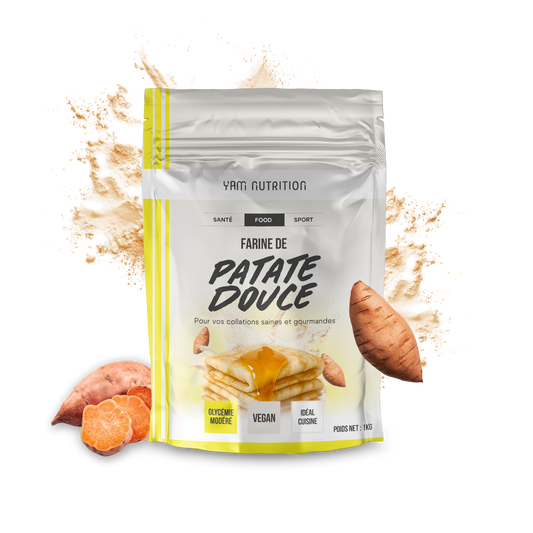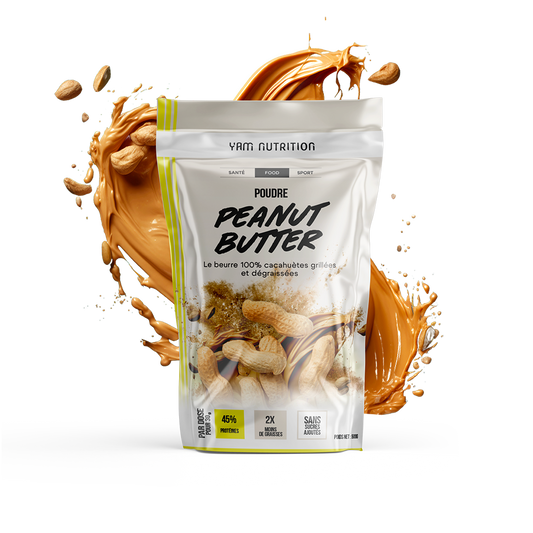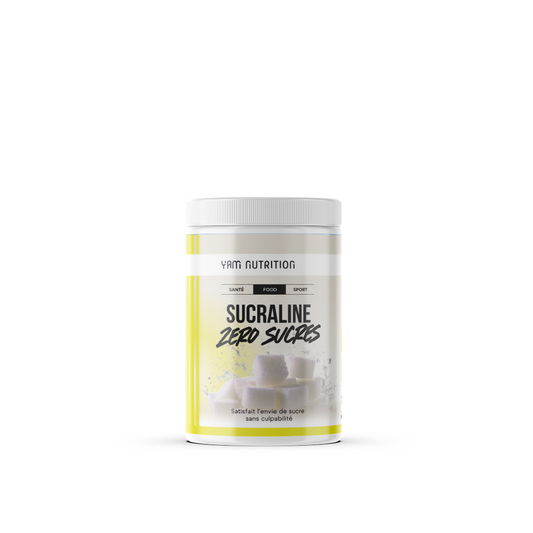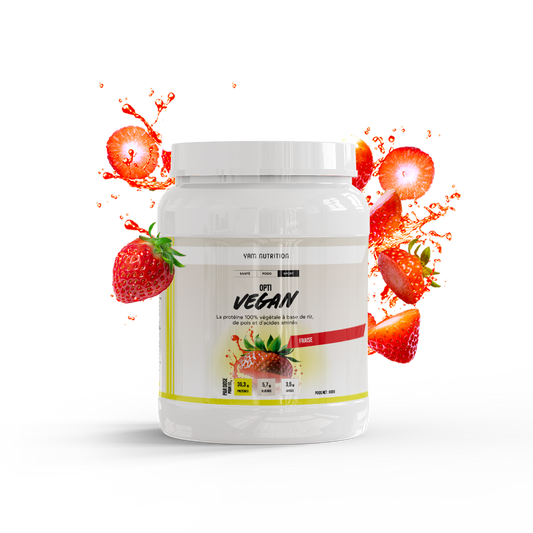Plant proteins vs. animal proteins: what are the differences for athletes?

Sommaire
- Proteins: definition and role
- Differences between animal and plant proteins
- Understanding the difference between the two types of proteins
- Plant and animal sources of protein differ in the micronutrients they provide.
- Importance of choosing the right protein source for athletes
- Biological value and bioavailability
- Amino acid profile: why is it important for athletes?
- The benefits of plant-based proteins for athletes
- Better cardiovascular health?
- Reduction of inflammation and muscle pain
- Improved recovery after exercise
- The best sources of plant-based protein for athletes
- Tips for a high-protein diet for athletes
- The importance of a balanced diet
- Recommended intake of plant or animal proteins for athletes
- Plant protein supplementation: when is it necessary?
Proteins: definition and role
Let's start by defining what a protein is, since most bodybuilders have only a vague idea of what it is. Basically, a protein is a source of nitrogen. This nitrogen is found in every amino acid that makes up a protein . Amino acids are the basic building blocks of proteins, only 20 of which are recognized by our genetic code, even though there are at least a hundred in nature. The nitrogen that proteins release is present on the amine base of each amino acid: N H2 or N H3. This amine base is linked to a carboxyl group COOH. From there, the free amino acids can combine to form peptides or proteins if there are more than fifty of them. These protein assemblies have two origins. Thus, they can be animal proteins or plant proteins.
For your healthy and delicious snacks Peanut butter made with 100% roasted peanuts 100% plant-based protein made from rice, peas and amino acids
Sweet potato flour
Sale price
From 19,90 €
Peanut Butter Powder
Sale price
24,90 €
Opti-Vegan
Sale price
From 37,90 €
Thus, we find these assemblies of amino acids associated in proteins first in plants and then in the organisms of animals, including those that serve as our food resources. In this way, the nitrogen present in the soil is captured by plants. Herbivorous animals then benefit from the plants they consume to develop, through the nitrogen assimilated from plant proteins. In this way, proteins of animal and plant origin differ, particularly in terms of the balance of their aminogram (relative balance of amino acids).
Differences between animal and plant proteins
Plants and vegetables fix nitrogen from the air around them, synthesizing most of the amino acids recognized and used by our genetic code to make our own proteins. It is therefore not surprising that certain amino acids are missing or low in concentration in certain plants that we regularly consume. However, most essential amino acids are present in plants, legumes or cereals found abundantly in nature. In the same way, herbivorous animals will synthesize themselves some of the essential amino acids they need. These same amino acids and peptides will then be found in high concentration in milk. These are of critical importance because milk is the only food that will nourish the newborn after birth. Breast milk will therefore be rich in peptides such as immunoglubulins which will stimulate the immune system of the little ones. This is why, for example, your famous " whey " is mainly composed of peptides that protect immunity. You therefore understand that nature does nothing by chance but also that proteins of animal origin are naturally more complete than those found in plants. Should we therefore consider that proteins of plant origin are less nourishing for athletes than proteins of animal origin?
Understanding the difference between the two types of proteins
An amino acid will always be the same, whether it is found in an animal or plant source of protein. However, proteins will be composed differently depending on the food source. Thus, the presence and balance of amino acids (also called aminogram) will differ depending on the food source. Sometimes, certain plants will have a relative deficiency in one or two amino acids but without much impact on the daily diet of an adult given the diversity of daily dietary intake. This is generally methionine, a sulfur-containing amino acid itself a precursor of cysteine. Other amino acids may also be present in smaller quantities, without any consequences for the health of vegetarians. Indeed, neither vegans nor omnivores are content to consume a single food per day and per meal. Deficiencies in essential amino acids would therefore be just as rare among vegetarians or vegans as they can be among omnivores.
Plant and animal sources of protein differ in the micronutrients they provide.
On the other hand, plant sources of protein differ greatly in nature from animal sources of protein, resulting in a notable difference in terms of nutrients. Thus, the plants we consume every day are naturally rich in fiber, unlike animal flesh, whether it is meat or fish, or even eggs. Let's just say that this is mostly stating the obvious. On the other hand, plants are very good sources of minerals such as magnesium, calcium, phosphorus, manganese and other trace elements. They also provide good amounts of vitamins such as vitamin A, B vitamins , vitamin C for citrus fruits, vitamin K or vitamin E for seeds and fruits of plants such as olives, walnuts, hazelnuts, peanuts or cashew nuts.
On the other hand, meat, fish or animal derivatives such as eggs and milk are good sources of iron, zinc, creatine and vitamin B12. These essential micronutrients are also frequently deficient in vegans, athletes, or sedentary people who do not control their diet. On the other hand, meat, fish, eggs, or milk do not provide fiber or B vitamins, which is why fruits and vegetables are necessary in the diet of omnivores. In addition, fatty acids omega 3 are necessary for vegans and omnivores alike. Olive oil, flaxseed oil, legumes, hazelnuts and peanuts provide omega 3 and omega 9.
Importance of choosing the right protein source for athletes
Proteins contribute to muscle growth, as bodybuilders know very well. To achieve this, a protein shake is a simple, practical, and effective solution for increasing your nutritional intake of pure protein while moderating your calorie intake. In short, sedentary people can perhaps get by with one gram of protein per kilogram of body weight (80 g of protein for an 80 kg person), but if you're doing bodybuilding, an intake equal to or greater than 1.6 g will logically be recommended. Therefore, complete proteins, that is, complete with essential amino acids, are essential if you want to take advantage of your bodybuilding workouts to gain muscle and strength.
The sources of animal proteins are complete and generally do not present deficiencies. Conversely, some sources of plant protein can be deficient in certain amino acids. Soy was an exception because it has an aminogram without any real defect. However, vegan athletes combine several sources of plant protein, legumes and cereals that perfectly compensate for each other. Plant protein mixtures, for example rice and peas, will therefore be entirely appropriate for vegan bodybuilding athletes. On the other hand, proteins of animal or plant origin must be easily assimilated, that is to say that the intestines must be able to assimilate the peptides and amino acids that have been broken down from the proteins by the stomach. This is how we speak of biological value and bioavailability of proteins.
Biological value and bioavailability
Biological value is a figure indicative of the nutritional quality of a protein . It is directly correlated with the composition and relative balance of amino acids present within the protein under examination. The reference biological value is that of the egg with a score of 100. However, whey proteins from milk generally obtain a higher score (110 to 115 on average) given their higher concentration of essential amino acids and leucine. Thus, the use of these proteins for anabolic purposes (protein synthesis) will naturally be higher. The biological value will therefore be more or less synonymous with the bioavailability of a protein. For example, a score of 85 means that 85% of the protein will be assimilated and used by the body.
Plant-based proteins score lower because they are slightly less well absorbed than animal sources. The high fiber and other nutrient content tends to reduce their intestinal absorption. However, since the variety of plant-based sources is greater, vegan athletes hardly suffer from this difference. Aware of this difference, vegetarian athletes generally consume slightly more plant-based protein foods.
Amino acid profile: why is it important for athletes?
The amino acid profile of proteins, or amino acid profile, is a critical component for muscle growth, as essential (as well as non-essential) amino acids must be present for our cells to synthesize new proteins. The relative balance between amino acids is very important. A deficiency or excess can lead to delayed or absent protein synthesis. For example, an excessive intake of BCAA will result in reduced tryptophan assimilation, while too little leucine will severely reduce muscle protein synthesis. However, when BCAAs are used during exercise, it is unlikely that this limitation actually occurs. Thus, the balance of an aminogram is directly related to the bioavailability of the proteins we have just explained. For example, if the egg has a score of 100, this means that its amino acid balance is close to ideal in terms of muscle protein assimilation and synthesis.
As for plant-based proteins, only soy is truly complete, while peas come very close. However, simply adding rice protein to pea protein will give you an optimal amino acid profile that can stimulate muscle growth. Add leucine or BCAAs, as well as methionine, and you have a plant-based equivalent. there whey . This is precisely what we did when we designed Opti-vegan…
The benefits of plant-based proteins for athletes
Plant-based proteins offer many benefits for athletes, whether vegan or omnivorous. Legumes and grains contribute significantly to protein intake for all athletes. Overall, plants provide dietary fiber, which aids digestion. They do not contain saturated fatty acids, as animal protein sources can. Legumes and oils provide Omega-3, Omega-6, and Omega-9 fatty acids (peanuts, olive oil, flaxseed oil). Due to the lower or nonexistent fat content of most fruits, plant-based foods contain far fewer calories. Thus, they contribute relatively little to overweight or obesity when consumed raw.
Yet, the greatest benefit of plant-based foods lies primarily in the phenomenal amount of antioxidants they release during digestion. Vegetables, fruits, citrus fruits, spices, and other plant-based foods provide you with countless polyphenols, flavonoids, and many other antioxidant molecules. Referred to as secondary metabolites, there are over 10,000 of them to date. They protect your body and each of your cells. In contrast, meat, fish, milk, or eggs provide very little in comparison.
Better cardiovascular health?
A scientifically proven consequence is that a higher consumption of plant-based proteins compared to a reduction in animal-based proteins represents a significant advantage when it comes to achieving better cardiovascular health. Excess saturated fats from fatty red meats may explain this finding. The higher fiber content of diets rich in fruits and vegetables also influences carbohydrate assimilation and insulin response, reducing the risk of weight gain and the negative consequences of type 2 diabetes on cardiovascular health.
Reduction of inflammation and muscle pain
As a direct and indirect correlation to the point mentioned above, the reduced presence of omega-6 fatty acids contributes to reducing systemic inflammation. Conversely, omega 3 and 9, as well as omega 7, help modulate inflammation as natural anti-inflammatories. In addition, excessive consumption of red meats, and too much fat, can be linked to excess uric acid in the blood with the formation of urate crystals that can affect kidney health. From there, muscle and joint pain can occur. Excess uric acid is linked to the digestion of purines from animal proteins. In addition, excessive uric acid levels can also affect muscle mass, increasing the risk of tendonitis and muscle strains. If high uric acid levels persist, kidney stones could form.
It all depends on the health, predispositions, and eating habits of individuals. If your diet is healthy and varied, and you are not overweight, uric acid will normally be filtered by the kidneys and excreted in the urine without any other consequences. Rigorous athletes are therefore unlikely to be affected by this health problem, but regardless of your physical condition, it is advisable to vary your diet and include enough vegetables and fruits. Even if you are not vegan, including more plant-based protein in your diet will allow you to reduce the presence of uric acid, maintain your kidney health in top form, and reduce the risk of excessive inflammation. As you have understood, proteins do not affect kidney health, but excess animal protein, combined with an unbalanced diet over time, can contribute to the onset of these disorders.
Improved recovery after exercise
Naturally, plant proteins contribute to recovery after exercise. Plant-based protein foods not only provide protein of appreciable nutritional quality, but also provide between 50 and 60% of assimilable carbohydrates. Similarly, the presence of B vitamins, notably thiamine (B1) and flavin (B2) and pantothenic acid (B5), contribute to the assimilation of carbohydrates and proteins. In addition, the antioxidants they contain help protect the body and muscles from rapid degradation linked to the presence of free radicals. In fact, intense bodybuilding workouts lead to an increased release of these free radicals, particularly in relation to high energy synthesis. Thus, they contribute perfectly to post-exercise recovery . So, a protein powder, such as pea and rice, is a convenient and delicious plant-based protein solution to take after an intense workout.
The best sources of plant-based protein for athletes
When combined, peas and rice are considered an excellent source of protein, as they complement each other very well in terms of amino acid balance. This plant-based protein complex is said to be of roughly the same nutritional quality as milk whey (or whey protein, if you prefer...). However, from a nutritional point of view, the pea provides a lot of fiber and carbohydrates. Rice provides even more, with a lower protein concentration of only 8%. Obviously, this figure applies to food. When protein is concentrated from the raw food, only the protein remains, with the fiber and other nutrients dissociated from the amino acids. In this way, we get 75% to 80% protein concentration from rice or peas.
It is on this nutritional foundation that we developed our Opti-Vegan plant-based protein. Based on a certified organic complex of pea and rice proteins, Opti-Vegan is perfectly flavored to offer you a delicious drink. A plant-based protein, Opti-Vegan is enriched with branched-chain amino acids (BCAA leucine, valine, isoleucine) as well as plant-based methionine. Perfectly formulated for bodybuilding athletes, our plant-based protein will amaze you with its absolutely delicious taste. You won't even believe it's a vegan protein!
Tips for a high-protein diet for athletes
Let's start by saying that the nutritional context of vegan bodybuilders is completely different from that of omnivores. However, a vegan protein powder is a functional food that is essentially identical to those based on milk or other animal sources of protein. Indeed, a protein shake is composed of pure protein, without residual sugars or fats. You can therefore benefit from Opti-vegan in the same way as you would from whey. That is to say, it provides you with a protein supplement with a moderate calorie intake, without other nutrients. In fact, Opti-Vegan will perfectly complement your daily diet. For example, if your workout is in the late afternoon, you will simply have to take an Opti-Vegan shake an hour and a half before exercise and another shake right after. This way, you will ensure your protein intake is optimal, just as an omnivore would with whey...
The importance of a balanced diet
There muscle growth of bodybuilders, whether omnivores or vegans, is based on a good nutritional balance. This requires an increased nutritional intake of protein compared to sedentary people, but also in terms of carbohydrates to promote energy during exercise. It will also be a question of having enough to activate all the processes linked to post-exercise recovery. Indeed, recovery after training uses a lot of energy from carbohydrates or fats to stimulate protein synthesis and the replenishment of muscle and liver glycogen. In athletic terms, an average intake of 4 grams per kilogram of body weight in carbohydrates per day is a good figure that bodybuilders can rely on. For an athlete weighing 80 kg, this would therefore represent approximately 320 grams of carbohydrates per day.
Recommended intake of plant or animal proteins for athletes
As for protein, the average is more like 1.6g/kg of body weight. An average intake of between 1.6 and 2.2g/kg of protein is enough to support muscle growth through hypertrophy. Beyond this figure, scientific research suggests that it would not be really necessary. Below this amount, it is likely that it could hinder the evolution of bodybuilders' physical performance and therefore slow their progress in mass and strength.
Plant protein supplementation: when is it necessary?
In order to support the growth of muscle fibers and the Post-workout recovery requires that your protein intake be fragmented. It is not uncommon for a weight training workout to require 72 hours for the muscles and nervous system to fully recover. Your three main meals of the day should therefore provide protein. You can then take one or two Opti-vegan shakes to optimize your pure protein intake. This type of sports nutrition has been proven for several decades. It is also possible to take a shake with a meal, especially breakfast, if the latter does not provide enough. With a protein diet (35 to 50 g/meal) and one or two Opti-Vegan shakes, you will get the protein necessary to improve your athletic performance, even if you are vegetarian or vegan.
Eric MALLET
Spécialiste en Nutrition Sportive
